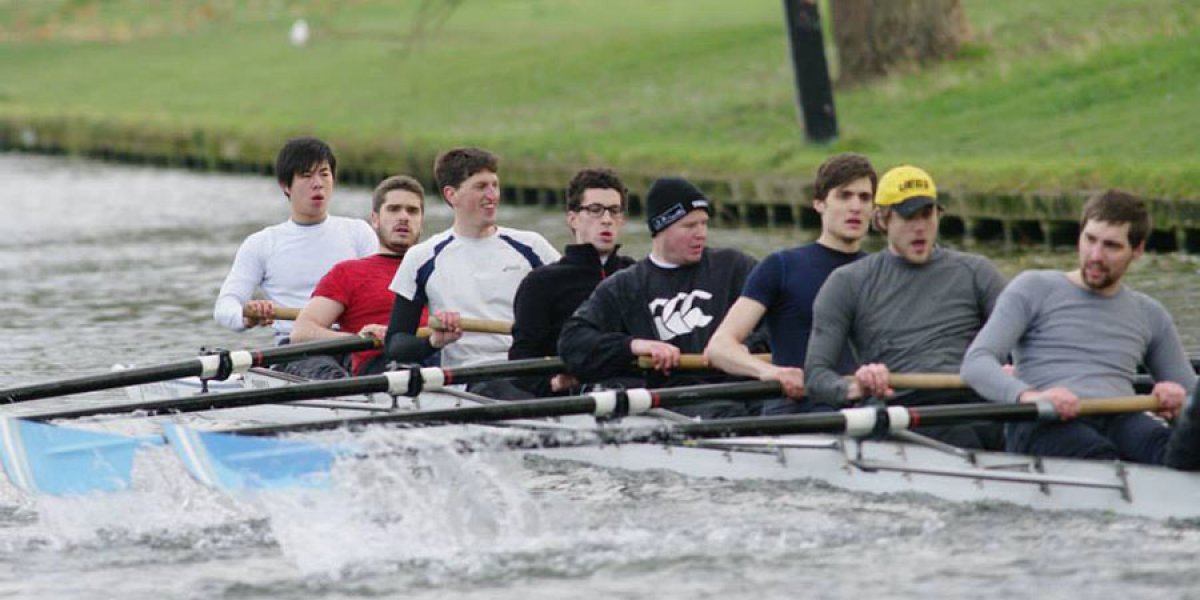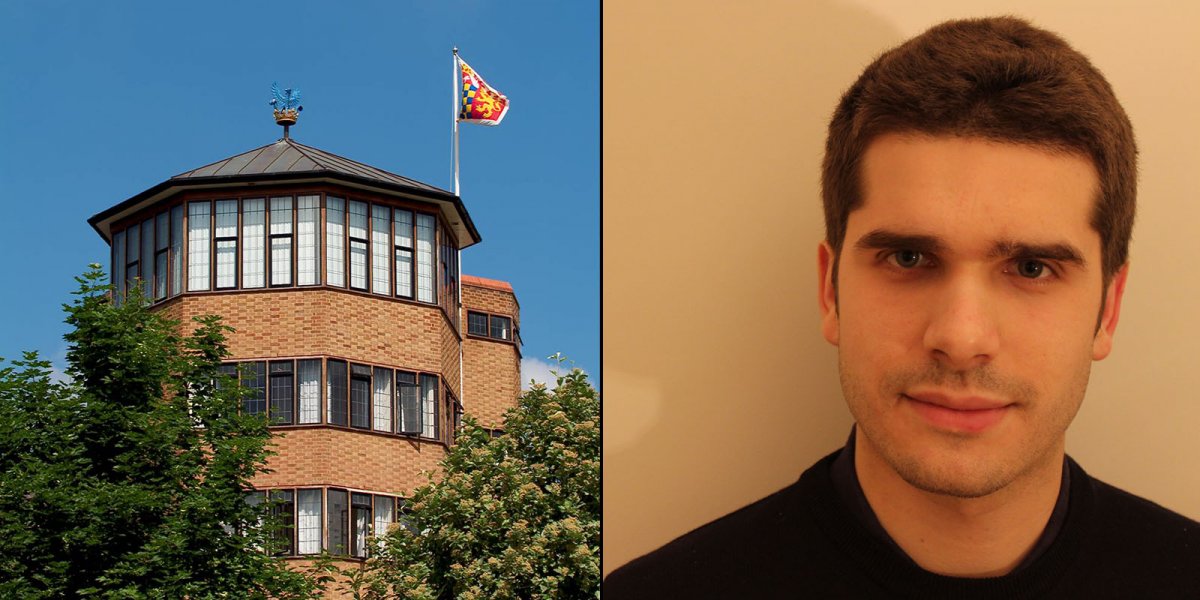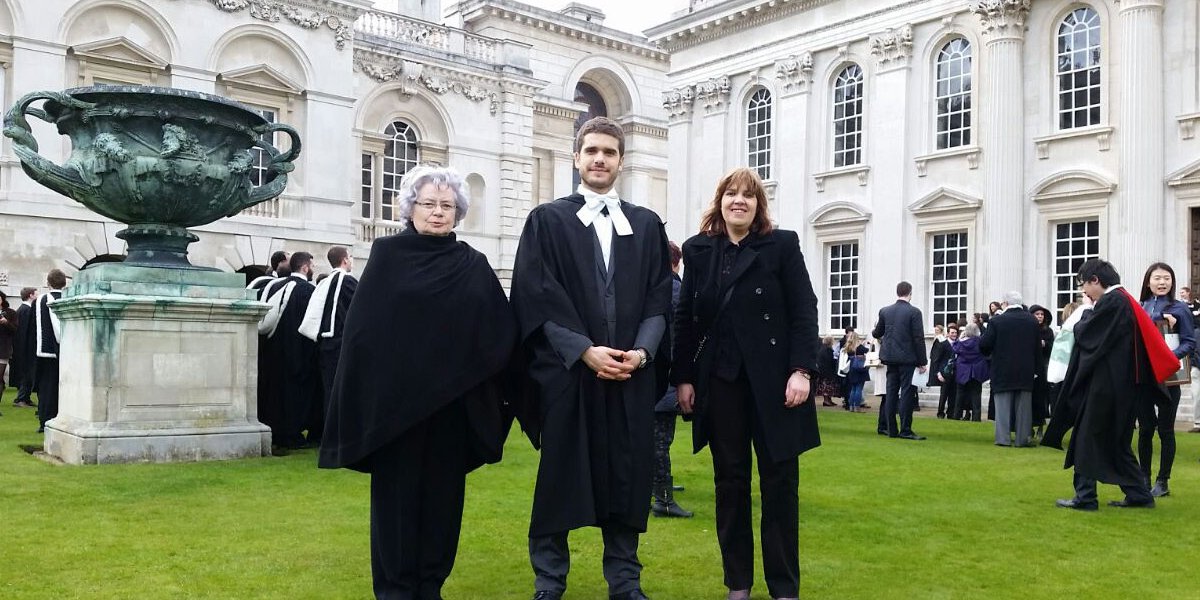Photo credit: Sir Cam
The life changing magic of Cambridge - Diego Oliveira Sanchez
Diego Oliveira Sanchez (St Edmund’s 2013) shares how discovering rowing at Cambridge was a turning point, impacting all areas of life.
I started to realise that the best predictors of success at Cambridge seemed to be hard work and dedication rather than IQ or innate ability.
I arrived at Cambridge to study at St Edmund’s College after completing a degree in physics in Spain. Out of all the available courses, I opted for an MPhil in Scientific Computing, a programme which focuses on using computer algorithms to solve physics problems. I arrived at Cambridge with a – perhaps immature – set of skills, world views, and habits. These were all soon to be challenged and developed far beyond my expectations. This is the story of how Cambridge changed my life.
Shaping skills and knowledge
Cambridge is an institution that can somehow endow ordinary humans with skills nearing superpowers – at least, I certainly felt this way during my year there. Once I started my course, I felt extremely fortunate: I was suddenly surrounded by some of the most talented and kind people I have ever met.
The fertile environment of the Cavendish Laboratory led me to learn about the technical areas I was interested in (maths, physics and computing) at an accelerated pace. In fact, I was learning more and faster than ever before. Teachers were passionate experts on their subject and my colleagues were as eager to learn as me. It was education heaven. The technical skills I developed at Cambridge have proved to be invaluable in my career and I am grateful for the pool of opportunities which this education opened up for me.
Widening world views
Before joining Cambridge, my views on the world were somewhat simplistic and limited in some regards. For instance, I used to believe only a born genius with extreme, innate talent could ever hope to be admitted to such a prestigious university and go on to do great things in life. The above in mind, I was hesitant at first to even send my application to the University – after all, I was no Isaac Newton or James C Maxwell. Despite my doubts, I gave it a shot and was eventually admitted to Cambridge. I am glad I mustered the guts to do it.
At Cambridge, I had the pleasure of meeting a few geniuses who I truly admired. Some of them even became friends and mentors, going on to teach me valuable lessons. However, after some time, I started to realise that the best predictors of success at Cambridge seemed to be hard work and dedication rather than IQ or innate ability. Realising the importance of passion and hard work made me see life through a different lens.
Often enough we sabotage ourselves with the belief that success is all about talent. This is dangerous, as it can prevent us from doing our best either out of disbelief or arrogance. As I lived at Cambridge and enjoyed time with colleagues and mentors, fear slowly led to a mysterious form of courage – the kind that makes you believe you can achieve anything.
Improving fitness and health
Before Cambridge, I used to be quite out of shape physically – the result of years of poor eating habits and no regular exercise. It all changed forever when, at the start of the term, I was bombarded by requests from the different sports clubs asking me to join their teams. I was used to being the kid that was good with maths, but clumsy with my feet – always being picked last when playing football. All of a sudden, I was in a place where everyone was welcome on the team. I left all of my excuses behind and decided to join the rowing society.
Somehow, after just a couple of days, I was regularly waking up at 6am several times a week, eager to hit the river with my teammates. Despite being busier than ever with studies, the constant encouragement and sense of comradery with my team pushed me to exercise more and acquire healthier habits.
At some point, I had inadvertently become physically fit and technically good enough at rowing to be invited to participate in a small weekend competition against other Colleges. Participating in a competition was a modest achievement, but it meant the world to me. It made me realise I could both achieve my academic and career goals and also take care of my health. More profoundly, rowing at Cambridge made me realise that I should never use my studies or career as an excuse for neglecting my health, family, friends or important projects.
Preparing for challenges
After finishing my studies, I felt prepared to tackle the challenges of either research or corporate employment. It took a lot of thought, but I decided I wanted to learn more about how big businesses work. I applied for some jobs and landed a position at Citigroup in London.
I spent a great year at Citi, where I developed my skills further and made meaningful friendships. During this time I also pondered what I wanted to do with my life next. Eventually I decided to quit my job and along with my partner started our own company. We worked tirelessly for almost a year but unfortunately our first venture failed.
The experience reminded me of my master’s project. This project lasted six months – and was successful in the end – but there were no results at all for the first two months! Sometimes in life, you discover after some time that you were using the wrong approach and have to start again. This happened to my project at Cambridge, and to my business. However, Cambridge taught me how to persevere – how to get back on my feet after failing.
Applying knowledge to business
With the first company, we created a product that nobody wanted to buy. The second time, we changed our approach. We applied something similar to the scientific method: in physics you start with a hypothesis and then try to run experiments that will invalidate your assumptions; the more experiments your idea survives, the more likely it is to be correct.
We decided to run experiments on our business hypotheses. Simply put: we came up with ten ideas and then interviewed hundreds of potential customers to validate our assumptions. After a month of research, we found that building software for nutritionists would be viable. All our other ideas – which sounded great initially – didn’t survive contact with customers.
Applying the concept of hypothesis validation led us to create NutriAdmin, a software product for nutritionists and dietitians that allows them to work more efficiently. NutriAdmin allows me to do meaningful work, work with my partner and to maintain the lifestyle I enjoy. We are creating value for nutritionists and have great plans for the future.
I feel that my time at Cambridge has been invaluable and helped to prepare me for the projects I participated in after University. I am grateful for the opportunity to study at Cambridge and would like to encourage all current students to make the most of their Cambridge experience, and to pursue their goals.
Diego Oliveira Sanchez has an MPhil in Scientific Computing and attended St Edmund’s College. He currently co-owns and manages NutriAdmin with his partner.


